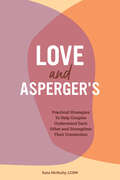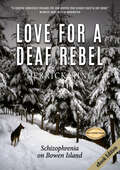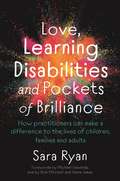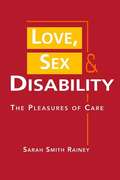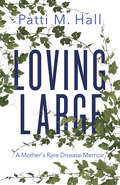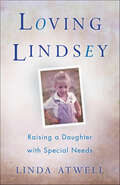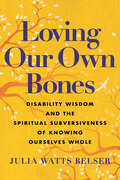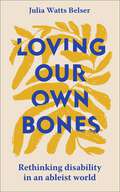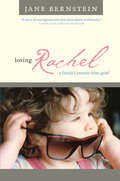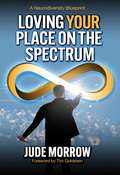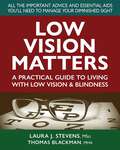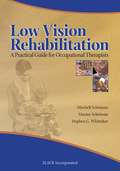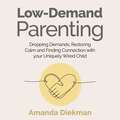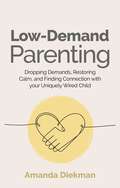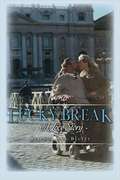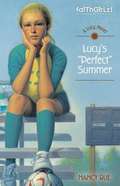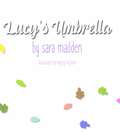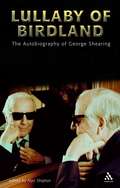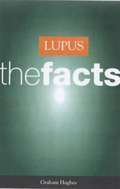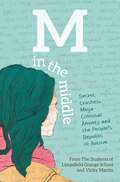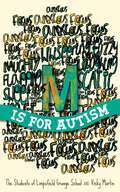- Table View
- List View
Love and Asperger's: Practical Strategies To Help Couples Understand Each Other and Strengthen Their Connection
by Kate McNulty LCSWLife with a partner whose neurotype is different than yours is filled with moments that can be surprising, unique, and sometimes challenging. Love and Asperger's is a helpful guide to everyday techniques to strengthen empathy and connection between neurodiverse couples—while keeping your love for each other at the center of everything. Life with a partner whose neurotype is different than yours is filled with moments that are surprising, unique, and sometimes challenging. If one of you is on the Autism Spectrum and the other is neurotypical, this Aspergers books is a helpful and inclusive guide to understanding the nature of your relationship and navigating its particular obstacles—while keeping your love for each other at the center of everything.Even though Aspergers is no longer an official diagnosis, many people—like you or your partner—may still fit the Aspergers profile and identify with the term. This book is designed with you in mind, featuring expert advice from relationship therapist Kate McNulty. Inside, you'll find engaging scenarios of couples experiencing similar challenges, combined with practical, evidenced-based solutions that address the needs and perspectives of both partners equally.Love and Asperger's helps you:Work together—Find easy ways to improve communication, cultivate emotional and physical intimacy, and maintain a commitment to learning about each other.Appreciate your differences—Open a window into the inner world of your partner, and the ways in which their experiences differ from yours so you can convey your own perspective more effectively.Break through the stereotypes—Sort out myths and facts so you can understand neurotypical and neurodiverse thinking and make your life together as a couple more loving and more rewarding.Deepen your relationship and your communication with an enlightening book on Aspergers and love.
Love for a Deaf Rebel: Schizophrenia On Bowen Island
by Derrick KingLove for a Deaf Rebel is the true story of a tumultuous romance. <P><P> With pathos and nostalgia, the author recounts his roller-coaster ride with Pearl, a vivacious deaf maverick, who, unknown to him, had paranoid schizophrenia. <P><P> We follow their encounters through actual notes written before Derrick learns sign language; we go on their motorcycle ride to Mexico and Guatemala; we watch as the happy couple moves to Bowen Island, a British Columbia community with just three paved roads. <P><P> Pearl and the author marry and build their dream home and hobby farm. They encounter one obstacle after another while building their life together as Pearl's perception of reality-and, crucially, their perception of each other-begins to change. <P><P> The author learns what it means to be deaf, what it means to struggle with mental health, and what it means to love such a woman unconditionally-the ecstasy and the agony. <P><P> A love story and memoir that touches on deafness, schizophrenia, and roughing it in isolated British Columbia.
Love on a Leash
by Liz PalikaFrom the Book jacket: Can my dog do therapy work? * Who can train a therapy dog? What does the owner need to know? How can my dog become certified? What problems am I likely to encounter? *Should our facility have its own resident therapy pet? If you have been asking some of these questions, Love On A Leash is the book for you! Liz Palika is an expert on dogs, training, and therapy work. 'Through her efforts thousands of people have been touched with canine affection. Now she shares that experience. Love on a Leash gives you all the tips, methods, and techniques for choosing, training, and working with a therapy dog, as well as telling you how to make your visit a success. You just may discover that you have a four-footed therapist waiting to share miraculous canine love!
Love, Learning Disabilities and Pockets of Brilliance: How Practitioners Can Make a Difference to the Lives of Children, Families and Adults
by Sara RyanFind some pockets of brilliance for your practice! Insights and inspiration from families of learning disabled people, who share their lives, challenges and wishes. Discover what sorts of help will really help the people you support.
Love, Sex, and Disability: The Pleasures of Care
by Sarah Smith RaineyRainey (women's studies, Bowling Green State U. , Ohio), whose late partner had multiple sclerosis, presents a study of relationships between disabled and nondisabled partners. Rather than dwell on popular culture and medical perspectives on such relationships, the author examines the complexities of care and sexual intimacy in pre-and post-disability couples in focus groups, in feminist, queer theory, and other postmodern frameworks. She concludes that feminist and disability activists/scholars need to develop new narratives that emphasize equality in such relationships. Methodological notes and an annotated list of the self-representations and articles analyzed are appended.
Lovey: A Very Special Child
by Mary MaccrackenHanna was more animal than child, and no one else wanted her in their classroom. Even in the school for emotionally disturbed children where Mary MacCracken taught, Hannah was considered a hopeless case. Could Mary reach her?
Loving Large: A Mother's Rare Disease Memoir
by Patti M. HallIf not me, then who will save my child? A mother must confront the unthinkable when her son is diagnosed with a rare medical condition. Patti M. Hall’s life is pitched into an abyss of uncertainty when a golf ball–sized tumour is discovered in her teenage son’s head and he is diagnosed with gigantism, a disease of both legend and stigma. After scrambling to access a handful of medical experts in the field, Patti learns that her son could grow uncontrollably, his mobility could be permanently limited, and his life could be cut short without timely and aggressive treatment. Patti’s attention shifts fully to her son, away from her relationships as well as her own career and health. Her new normal sees her step into a dozen additional roles, including nurse, researcher, advocate, risk assessor, and promise maker, while she struggles and fails to rebuild her life as a recently divorced woman. In Loving Large, Patti discovers that resilience is learned and that the changes experienced in the aftermath of crisis can often create the greatest opportunities.
Loving Lindsey: Raising a Daughter with Special Needs
by Linda AtwellWinner - 6th Annual Beverly Hills Book Award for Relationships and Parenting & Families Award Finalist in the "Parenting & Family" category of the 2017 Best Book Awards Finalist, 2018 Next Generation Indie Book Awards in the category of Memoirs—Overcoming Adversity/Tragedy Linda Atwell and her strong-willed daughter, Lindsey—a high-functioning young adult with intellectual disabilities—have always had a complicated relationship. But when Lindsey graduates from Silverton High School at nineteen and gets a job at Goodwill, she also moves into a newly remodeled cottage in her parents’ backyard—and Linda believes that all their difficult times may finally be behind them. Life, however, proves not to be so simple. As Lindsey plunges into adulthood, she experiments with sex, considers a tubal ligation, and at twenty quits Goodwill and runs away with Emmett, a man more than twice her age. As Lindsey grows closer to Emmett, she slips further away from her family—but Linda, determined to save her daughter, refuses to give up. A touching memoir with unexpected moments of joy and humor, Loving Lindsey is a story about independence, rescue, resilience, and, most of all, love.
Loving Our Own Bones: Disability Wisdom and the Spiritual Subversiveness of Knowing Ourselves Whole
by Julia Watts BelserA transformative spiritual companion and deep dive into disability politics that reimagines disability in the Bible and contemporary cultureAn essential read that will foster and enrich conversations about disability, spirituality, and social justice&“What&’s wrong with you?&”Scholar, activist, and rabbi Julia Watts Belser is all too familiar with this question. What&’s wrong isn&’t her wheelchair, though—it&’s exclusion, objectification, pity, and disdain.Our attitudes about disability have such deep cultural roots that we almost forget their sources. But open the Bible and disability is everywhere. Moses believes his stutter renders him unable to answer God&’s call. Jacob&’s encounter with an angel leaves him changed not just spiritually but physically: he gains a limp. For centuries, these stories have been told and retold in ways that treat disability as a metaphor for spiritual incapacity or as a challenge to be overcome.Through fresh and unexpected readings of the Bible, Loving Our Own Bones instead paints a luminous portrait of what it means to be disabled and one of God&’s beloved. Belser delves deep into sacred literature, braiding the insights of disabled, feminist, Black, and queer thinkers with her own experiences as a queer disabled Jewish feminist. She talks back to biblical commentators who traffic in disability stigma and shame. What unfolds is a profound gift of disability wisdom, a radical act of spiritual imagination that can guide us all toward a powerful reckoning with each other and with our bodies.Loving Our Own Bones invites readers to claim the power and promise of spiritual dissent, and to nourish their own souls through the revolutionary art of radical self-love.
Loving Our Own Bones: Rethinking disability in an ableist world
by Julia Watts BelserOpen the Bible, and disability is everywhere. Moses stutters and thinks himself unable to answer God's call. Isaac's blindness lets his wife trick him into bestowing his blessing on his younger son. Jesus heals the sick the blind, the paralyzed, and the possessed. For centuries, these stories have been told and retold by commentators who treat disability as misfortune, as a metaphor for spiritual incapacity, or as a challenge to be overcome.Loving Our Own Bones turns that perspective on its head. Drawing insights from the hard-won wisdom of disabled folks who've forged difference into fierce and luminous cultural dissent, Belser offers fresh and unexpected readings of familiar biblical stories, showing how disability wisdom can guide us all toward a powerful reckoning with the complexities of the flesh. She talks back to biblical commentators who traffic in disability stigma and shame, challenging interpretations that demean disabled people and diminish the vitality of disabled lives. And she shows how Sabbath rest can be a powerful counter to the relentless demand for productivity, an act of spiritual resistance in a culture that makes work the signal measure of our worth.With both a lyrical love of tradition and incisive political analysis, Belser braids spiritual perspectives together with keen activist insights-inviting readers to claim the power and promise of spiritual dissent, to nourish their own souls through the revolutionary art of radical self-love.
Loving Rachel: A Family's Journey from Grief
by Jane BernsteinIn 1983, Jane Bernstein had everything she ever wanted: a healthy four-year-old daughter, Charlotte; a happy marriage; a highly praised first novel; and a brand new baby, Rachel. But by the time Rachel was six weeks old, a neuro-ophthalmologist told Jane and her husband that their baby was blind. Although there was some hope that Rachel might gain partial vision as she grew, her condition was one that often resulted in seizure disorders and intellectual impairment. So began a series of medical and emotional setbacks that were to plague Rachel and her parents and strain their marriage to the breaking point. Spanning the first four years of Rachel’s life, Loving Rachel is a heartbreaking chronicle of a marriage and a compelling story of parental love told with searing honesty and surprising humor.
Loving Your Place on the Spectrum: A Neurodiversity Blueprint
by Jude MorrowLoving Your Place on the Spectrum: A Neurodiversity Blueprint provides answers to many of your questions about autism, helping you to embrace neurodiversity and love your autistic self and the autistic people in your life. Jude Morrow speaks from personal experience when he says that he has learned to be proud to be autistic and he wants you to be proud too.Browse through the many books available on autism and you might notice a trend: too many of them are written by neurotypical professionals who aim to &“fix&” autism or help autistic people appear &“normal.&” Jude Morrow noticed this problem and decided that something needed to change. Loving Your Place on the Spectrum is a guide for living a happy and successful autistic life. Jude combines his own experiences as an autistic man with the stories of others to provide a handbook to help autistic individuals navigate life&’s major changes, from childhood to college, jobs, and relationships. Each chapter identifies common issues faced by autistic people of a particular age or social group and explains how educators, teachers, parents, and professionals can be supportive through all these life stages. The world needs a new perspective on autism, and Jude Morrow&’s Loving Your Place on the Spectrum provides parents, workplaces, individuals, and society an alternative, strengths-based viewpoint, where autistic people are accepted, embraced, and loved.
Low Vision Matters
by Laura Stevens, MSci Thomas BlackmanAccordingto the Centers for Disease Control and Prevention (CDC), over seven millionpeople in the US alone suffer from severe vision loss or blindness. In thepast, low vision was truly a life-altering condition. Those seemingly everydaytasks that were once so simple instead became difficult—whether one had towork, cook, read, drive, go out to shop, or even turn on a light switch, one&’sworld had been completely turned upside down. Today, however, things havebegun to change. With the revolution of Artificial Intelligence (AI) alreadyunderway, many of the major barriers caused by diminished or fully lost visionhave been lessened or completely eliminated. In Low Vision Matters, authors Laura Stevens and Thomas Blackmanprovide a comprehensive guide to all the aids and equipment now available—alongwith important practical advice—to those who are vision-challenged.Thebook is divided into two parts. Part One focuses on the day-to-day activitiesthat low vision can affect—from safety in your home or traveling outside, tothe handling of finances or one&’s home entertainment system. It discusses thelatest technologies that can enable a person with eyesight problems toturn on a light, start a dishwasher, or even answer a phone through the use oforal commands—and that&’s just the tip of the iceberg. Part Two then provides abreakdown of the various kinds of helpful vision-aid products now available.Because the authors understand the costs involved in purchasing such equipment,they include the names of those organizations and associations in an extensiveResources section along with various other crucial contacts about which thosewith low vision and their loved ones and caretakers need to know.Timeshave changed. Low Vision Mattersprovides a wealth of information that can vastlyimprove the daily life of a person living with vision loss or blindness.
Low Vision Rehabilitation: A Practical Guide for Occupational Therapists
by Mitchell Scheiman Maxine Scheiman Stephen G. WhittakerLow vision rehabilitation is rapidly growing as a specialty practice for occupational therapists. This growth requires practical, evidence-based information on the evaluation and treatment of the effects of low vision on occupational performance. Responding to this need, Low Vision Rehabilitation: A Practical Guide for Occupational Therapists blends standards of practice that have been developed over 50 years by low vision therapists and optometrists, with the latest scientific research and the unique perspective of occupational therapists. Low Vision Rehabilitation presents an emerging model in which occupational therapists practice as part of a team of vision rehabilitation professionals serving adults with low vision. Occupational therapists offer a unique contribution to the vision rehabilitation team, with a focus on meaningful occupational goals, the incorporation of occupation into therapy, and the orchestration of environmental, social, and non-visual personal factors into a treatment plan. Mitchell Scheiman, Maxine Scheiman, and Stephen Whittaker have developed a practical and straightforward text outlining an evaluation approach to interventions that focus on recovering occupational performance in adults. Special features * Incorporates concepts from the AOTA Occupational Therapy Practice Framework: Domain and Process * Provides most of the core knowledge required for the ACVREP low vision certification examination and AOTA specialty certification in low vision * Includes an occupational therapy vision rehabilitation evaluation consisting of four components: occupational profile/case history, evaluation of visual factors, environmental evaluation, evaluation of occupational performance * Emphasizes intervention and low vision rehabilitation treatment including modification of the environment, use of non-optical assistive devices, use of optical devices, and use of computer technology * Provides valuable information on how to start an independent practice in low vision rehabilitation * Includes chapters on diabetic management and electronic assistive technology * Includes access to a companion website with printable forms and additional resources with text purchase Written by authors who are optometrists, occupational therapists, researchers, and certified low vision therapists (CLVT), Low Vision Rehabilitation employs an interdisciplinary perspective that is unique, practical, and credible.
Low Vision: A Resource Guide with Adaptations for Students with Visual Impairments
by Nancy Levack Gretchen Stone Virginia BishopA user friendly guide to current philosophies on up-to-date medical, optical, and technical information, and practical methodologies and adaptations for Students with Visual impairments.
Low Vision: Reflections of the Past, Issues for the Future
by Jane N. Erin Virginia E. Bishop Anne CornThis research report, based on a multiphase survey of professionals, identifies important trends into the next century. Designed for administrators, policy planners and university instructors, as well as for direct service providers, Low Vision includes background overview papers by six eminent leaders in the low vision field.
Low-Demand Parenting: Dropping Demands, Restoring Calm, and Finding Connection with your Uniquely Wired Child
by Amanda DiekmanShort, easy-read guide for parents on how to reduce family conflict by dropping unnecessary demands from daily life to help neurodivergent families to thrive."Low-demand parenting requires radical acceptance. It says to the kid right in front of you, I see you, just as you are. - You are ok here. I love you right here."Parent to neurodivergent children and autistic adult, Amanda Diekman, outlines a parenting approach that finally lowers the bar for the whole family, enabling the equilibrium of the home to be restored.Low-demand parenting allows you to drop the demands and expectations that are making family life impossible and embrace the joyful freedom of living life with low demands. It can be a particularly effective approach for children with high anxiety levels including neurodivergent children. Amanda talks from experience and teaches you how to identify what the big, tiny and invisible demands are for your own child and gives you the step-by-step instructions on how to drop them.Full of practical resources and scripts that are easy to implement in busy everyday life, this book is your flashlight and your map to parenting your uniquely wired child. It will not tell you where to go, but it will help you find your way so you and your family thrive.(P) 2023 Jessica Kingsley Publishers
Low-Demand Parenting: Dropping Demands, Restoring Calm, and Finding Connection with your Uniquely Wired Child
by Amanda Diekman"Low-demand parenting requires radical acceptance. It says to the kid right in front of you, I see you, just as you are. - You are ok here. I love you right here."Parent to neurodivergent children and autistic adult, Amanda Diekman, outlines a parenting approach that finally lowers the bar for the whole family, enabling the equilibrium of the home to be restored.Low-demand parenting allows you to drop the demands and expectations that are making family life impossible and embrace the joyful freedom of living life with low demands. It can be a particularly effective approach for children with high anxiety levels including neurodivergent children. Amanda talks from experience and teaches you how to identify what the big, tiny and invisible demands are for your own child and gives you the step-by-step instructions on how to drop them.Full of practical resources and scripts that are easy to implement in busy everyday life, this book is your flashlight and your map to parenting your uniquely wired child. It will not tell you where to go, but it will help you find your way so you and your family thrive.
Lucky Break
by Belinda BegleyFormer volleyball player Kirk Kilgour is awakened from an intense dream about his earlier life by the Northridge earthquake. Kirk, a high-level quadriplegic as the result of a training accident, is trapped in his bed until help arrives to clear debris from his room and begin the difficult four hour process of getting him ready for the day. The forty-seven-year-old man had been a college All-American before becoming a professional volleyball player who was living in Italy with his wife at the time of the injury. <p><p> In the first days after his life changed forever, he decided to become “the best quadriplegic in the world.” Although he loses his career, his wife, and the use of most of his body, he lives a life with no regrets, one in which he chooses happiness each day. Belinda is a forty-six-year-old divorced mother of three and self-professed sports junkie. Although content with her life in Vail, Colorado, she desires what she has never known—a man worthy of her love. Belinda learns of Kirk through her friendship with his nephew, who tells her that his uncle is a professional broadcaster who might possibly be looking for a new attendant to accompany him to the 1996 Atlanta Olympics. Although she has no background in personal health care, Belinda becomes obsessed with the idea of working for Kirk at the Olympics, and she pursues the idea for a year. <p><p> A telephone meeting is finally arranged between the two, and after some thought Kirk invites her to Los Angeles to train as his attendant. Belinda is initially excited about the trip but then begins to wonder about the wisdom of her idea. When she meets Kirk in person, she is taken aback by his appearance because all she can see is the power wheelchair. Kirk, smitten with Belinda from the start and always the competitor, decides that he will win her affection. Kirk has a way of making people quickly forget about the disability. When Belinda sees Kirk out of the wheelchair for the first time, she begins to regard him as a man, a very handsome man.
Lucy's Perfect Summer
by Nancy RueFacing up to a cheater at an elite soccer day camp and some difficult events at home helps eleven-year-old Lucy do some growing up during a summer which, while very different from the one she imagined, turns out to be just right.
Lucy's Umbrella
by Sara MaddenLucy has vitiligo. She finds beauty in the patterns on her skin. She also finds beauty in the patterns she notices out in nature. Follow Lucy as she goes on a walk through nature, admiring everything she sees.
Lullaby of Birdland
by George Shearing Alyn ShiptonBritish pianist George Shearing emigrated to the United States in 1947, going on to achieve success in an American jazz world impressed with the accomplishments of the blind musician. In his autobiography he narrates his childhood, his beginnings in music, and his activities and encounters in the world of jazz. Annotation ©2004 Book News, Inc., Portland, OR (booknews.com)
Lupus The Facts
by Graham HughesThis easy-to-read book explains Lupus. How does Lupus affect people? What can be done if someone develops lupus?
M in the Middle: Secret Crushes, Mega-Colossal Anxiety and the People’s Republic of Autism
by The Students of Limpsfield Grange School Vicky MartinI'll never have a Card Emporium series of life events: a boyfriend, a fiancé, a husband and a future. A future with lots of sparkly cards celebrating all these big life events. I was on course and now I'm not. Life after diagnosis isn't easy for M. Back in her wobbly world, there are lots of changes and ups and downs to get used to, not just for M, but for her friends and family too. Faced with an exciting crush, a pushy friend and an unhelpful Headteacher, how long until the beast of anxiety pounces again? Written by Vicky Martin and the students of Limpsfield Grange, a school for girls with Autism Spectrum Disorder and communication and interaction difficulties, M's story draws on the real life experiences of teens with autism.
M is for Autism
by Robert Pritchett The Students of Limpsfield Grange School Vicky MartinM. That's what I'd like you to call me please. I'll tell you why later. Welcome to M's world. It's tipsy-turvy, sweet and sour, and the beast of anxiety lurks outside classrooms ready to pounce. M just wants to be like other teenagers her age who always know what to say and what to do. So why does it feel like she lives on a different plane of existence to everyone else? Written by the students of Limpsfield Grange, a school for girls with Autism Spectrum Disorder with communication and interaction difficulties, M is for Autism draws on real life experiences to create a heartfelt and humorous novel that captures the highs and lows of being different in a world of normal.
